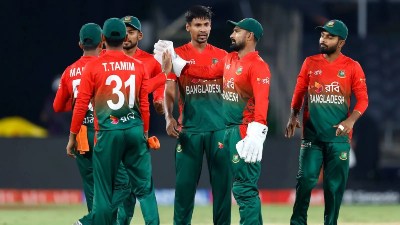The magnificent aam aadmi
Remembering Mirza Ghalib8217;s passion for mangoes on his 210th birth anniversary

ALTAF HUSSAIN HALI, an ardent admirer of Ghalib and himself a poet, once had a very hotly argued debate with Ghalib8217;s friend, Nawab Mustafa Khan Shefta. Hali maintained that Ghalib was the only Indian poet to have tasted the largest variety of mangoes. Shefta disagreed. Hali was actually right. Ghalib had tasted most of the 4000 varieties of mangoes grown in India.
The poet mentioned various varieties of the fruit in his letters to friends. For instance, he wrote a short history of the mango to his friend, Maulvi Sadruddin Azurda: 8220;The mango has been cultivated in India for over 4000 years and is so much a part of the Indian heritage and culture that it is almost an object of veneration in Hindu households. Down through the centuries, emperors have pledged their devotion to the mango8230;8221;
According to Ghalib it is a remarkable fruit in the sense that it can be cut with a knife, sucked or crushed for its juice. He asked friends living as far away as Calcutta, Bombay and Madras to send him local mangoes and, fortunately, they obliged him. To a friend living in Calcutta, Mir Sarfaraz Hussain, he wrote as many as 15 letters requesting him to send him Bengal8217;s famous Gulbakhsh mangoes. Sarfaraz Hussain finally sent him two baskets. To Ghalib8217;s chagrin, of the 200 in the baskets, only 83 were worth eating. The rest had evidently become rotten during transportation and he rued the fact that his friend did not have the foresight to send him unripened fruit.
During May 1857, when the uprising of the sepoys was at its height, Ghalib visited a friend in Meerut, who owned many mango orchards in Meerut and Saharanpur. One afternoon, Ghalib felt the urge to eat a mango. Unfortunately, the mangoes here do not ripen until June and Ghalib had to content himself with gazing at the unripe fruit. That was when a British soldier came upon him and arrested him. The poet was taken to the Meerut kotwali. There Colonel Burn, the military governor, asked Ghalib whether he was a Muslim. Ghalib, ever the wit, replied, 8220;I am only a half-Muslim.8221; When Burn demanded he explain himself, he said, 8220;By that I mean, sir, that I take liquor but I do not touch pork!8221; On hearing this, the colonel burst out laughing and let him off after advising him not to mix up with the rioters.
Different varieties of the fruit would be sent to Ghalib from far and wide, but his appetite for the fruit was insatiable. Shefta later recalled one particular gathering where Ghalib was present with friends. People were expressing their views on what made mangoes special. When everyone had had their say, the host sought Ghalib8217;s opinion. 8220;In my opinion, there are only two necessary requirements for mangoes. First, they should be sweet; second, they should be plentiful!8221; he pronounced. There was nothing more to add!
- 01
- 02
- 03
- 04
- 05































